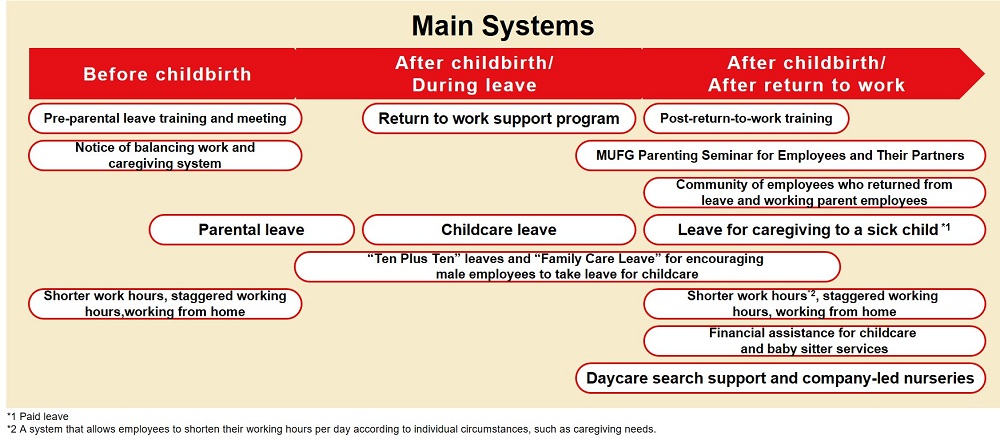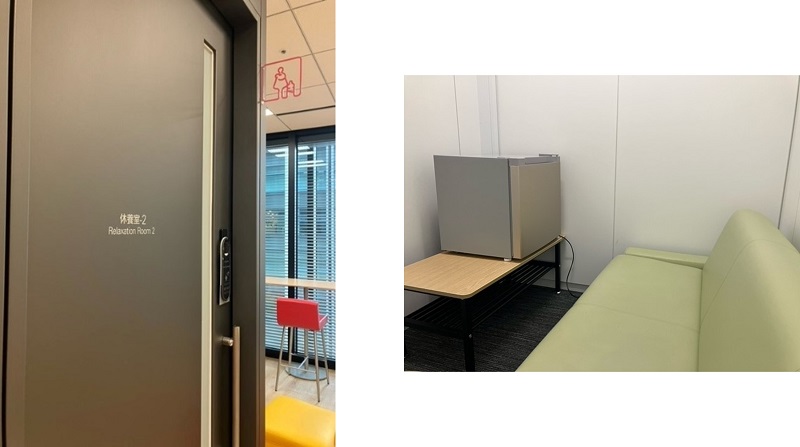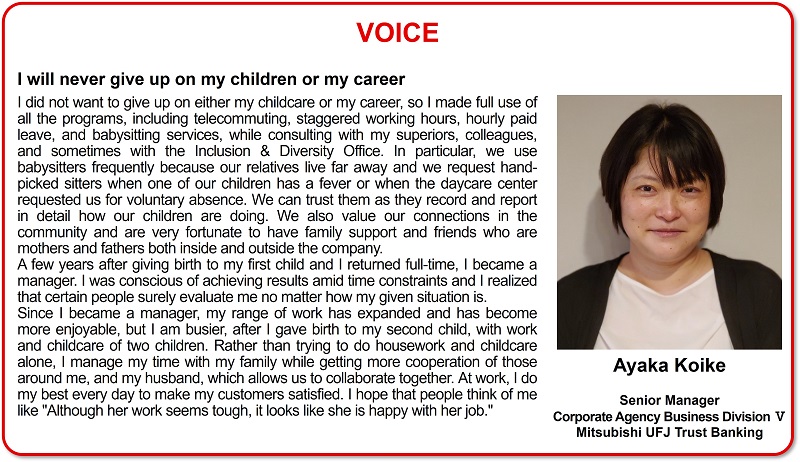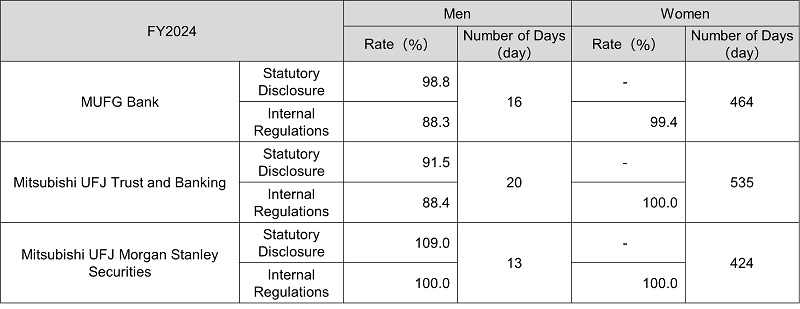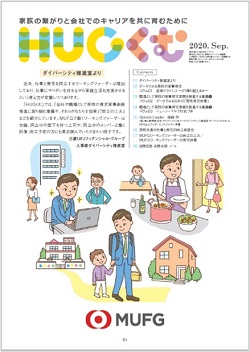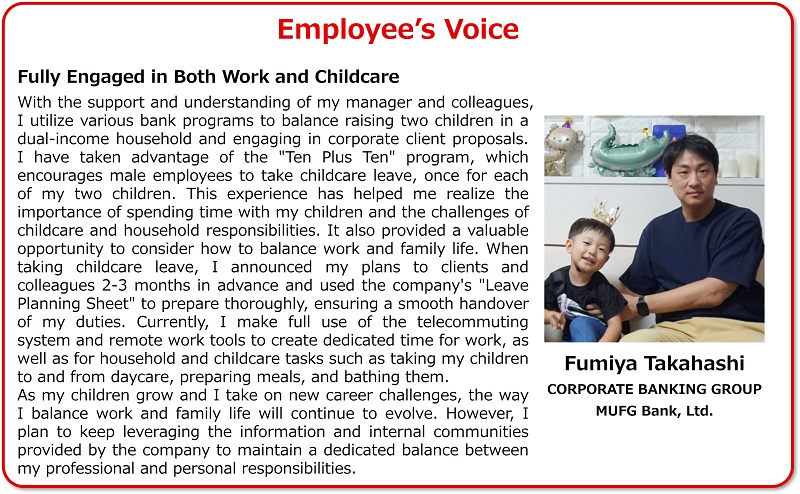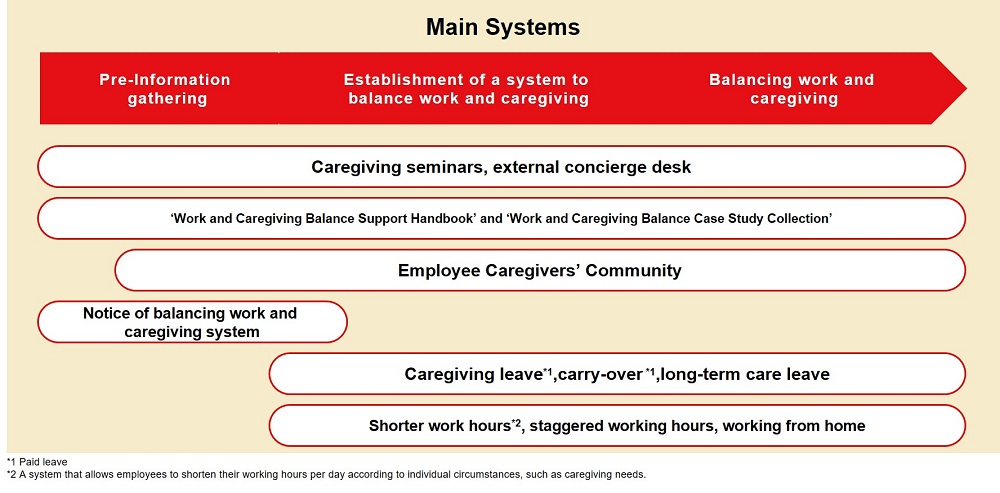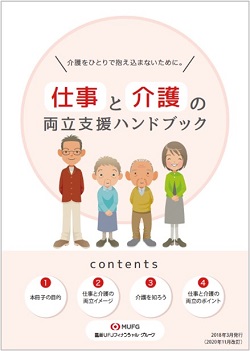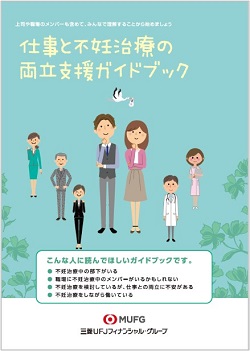Support for Balancing Work and Childcare
At MUFG, we offer programs and systems to support employees who are involved in childcare and household responsibilities, regardless of gender. Additionally, we promote the participation of men in childcare and strive to foster a workplace culture where all employees can practice a balanced work style that emphasizes efficiency and productivity.
Supporting the Smooth Career Continuation of Employees Taking Maternity and Childcare Leave
We support continuous career development by providing training for employees before and after leave, and by establishing systems that enable flexible working arrangements. Since fiscal year 2021, the Bank, the Trust Bank, and MUMSS have jointly held post-return training sessions, offering employees from all three companies the opportunity to consider their working styles after returning to work. Additionally, we support the early return of employees on childcare leave through collaboration with company-sponsored childcare facilities and various subsidy programs.
Establishing Systems and Environments to Support Early Return to Work
At MUFG, we focus on supporting the career development and advancement of female employees by providing early return-to-work support from childcare leave and post-return support. Specifically, we have established a system called "Childcare Time" for employees who return to work early before their child turns one year old. Under this system, employees can take two 30-minute paid childcare breaks per day, in addition to regular breaks and short working hours, until their child turns one year old.
Furthermore, in the Bank's market division, as part of initiatives to support early return to work from parental leave, a "Nursing Room" has been set up within the existing women's break room. This space allows female employees who have returned to work to use it for lactation by utilizing "Childcare Time." By expanding such initiatives, we aim to create an environment where more female employees can confidently return to work early after childcare leave.
Encouraging Male Employees to Participate in Childcare
Across our group companies, we aim to create a workplace environment where both men and women can balance work and childcare, ensuring that the burden of childcare and household responsibilities does not fall disproportionately on women. We have implemented initiatives to promote the uptake of childcare leave by male employees, raising awareness about the importance of a balanced work style and fostering understanding among colleagues who balance work and childcare. Since fiscal year 2019, we have been encouraging male employees to take approximately one month of childcare leave or vacation.
Status of Childcare Leave Utilization(note)
- Statutory disclosure is based on the "Act on the Welfare of Workers Who Take Care of Children or Other Family Members Including Child Care and Family Care Leave."
Internal regulations are calculated as "(Number of employees who took childcare leave during the eligible period for taking childcare leave ÷ Number of employees whose childcare leave eligibility period ended during the current fiscal year) ×100.
Providing Information to Those Balancing Work and Childcare
We provide information to employees balancing work and childcare through various publications, such as the "HUGkumu" booklet for men on balancing work and childcare, and the "Overcoming the First Grade Hurdle (Shoichi-no-kabe)(note)" case study collection for employees concerned about their work style after their children start elementary school. These resources collect voices from experienced parents and highlight the importance of men's involvement in childcare and household responsibilities. They also offer tips and examples on how to efficiently manage both work and childcare, and how to maintain a balanced work style. These materials are not only useful for employees balancing these responsibilities but also help managers and colleagues understand the realities of managing both work and childcare.
- The term "First Grade Hurdle(Shoichi-no-kabe)" refers to the challenges parents face when their children start elementary school, such as the difficulty of arranging extended childcare in the evenings, dealing with summer vacations, unexpected school closures, and PTA activities, which may force changes in their work style.
Support for Balancing Work and Caregiving
By 2025, the baby boomer generation (born between 1947 and 1949) will be 75 years old or older, leading to an anticipated increase in elderly individuals requiring care and a corresponding rise in employees leaving their jobs to provide such care. This is becoming a significant social issue. In response to this situation, we are committed to supporting all employees, including part-time staff, in balancing work and caregiving responsibilities. In addition to providing various types of information, we have established a range of support systems to ensure that employees can continue working while caring for their family members who need assistance.
Work-Life Balance Support Programs for Caregiving Responsibilities
Representative Training and Programs
Providing Information on Caregiving
We provide information to employees across our group companies to help them balance work and caregiving responsibilities. For employees and their families, we have introduced a caregiving information website that includes a consultation service with experts and a search function for caregiving facilities and services. This service is available not only to those currently providing care but also to those who may need to in the future. Employees can consult caregiving experts via phone or email and gather necessary information as needed. Additionally, we have published a "Work and Caregiving Support Handbook," which consolidates basic information related to balancing work and caregiving. This handbook serves as a preparation tool to help employees smoothly handle caregiving responsibilities that may arise unexpectedly.
Sharing of Best Practices for Balancing Work and Caregiving
For those currently providing care, we have published a "Work and Caregiving Case Study Collection" that includes real-life challenges faced by experienced caregivers and things to prepare in advance. This resource supports the creation of a balanced work-caregiving system. Additionally, the Bank, the Trust Bank, and MUMSS have established employee communities where current caregivers, their managers and colleagues, and those with caregiving experience can connect and exchange information related to caregiving.
Support Balancing Work and Fertility Treatment
At MUFG, we offer various programs to support all employees, including part-time staff, who are undergoing fertility treatments. These programs aim to alleviate the financial, time, physical, and emotional burdens associated with fertility treatments, helping employees balance their work and personal lives.
Programs Available to Employees Undergoing Fertility Treatment
At our major group companies, we have established flexible working arrangements to reduce the time burden for employees undergoing fertility treatment. These include special paid leave for fertility treatment, accumulated leave, and flexible working hours such as late arrivals and early departures. Additionally, we support employees in balancing work and fertility treatment through internal consultation services that maintain privacy, as well as supplementary benefits for high-cost medical expenses provided by our health insurance association.
Efforts to Raise Awareness About Fertility Treatment
We have published a "Work and Fertility Treatment Support Guidebook" not only for employees undergoing treatment or considering it in the future, but also for their managers and colleagues. This guidebook provides information on fertility treatment and workplace communication methods, helping to create a work environment that facilitates the balance between work and fertility treatment. Additionally, to enhance overall workplace understanding, we conduct seminars organized by the HR department as well as department- and branch-level seminars led by volunteer employees.
Provision of Flexible Work Styles
At MUFG, we actively leverage hybrid communication methods, combining in-person and virtual interactions. We are advancing a work system and workplace environment that enables employees to work more autonomously and efficiently, tailored to their tasks and life stages, without being bound by location or time. We aim to create a company where all employees can enhance their productivity, unleash their creativity, and thrive with enthusiasm.
